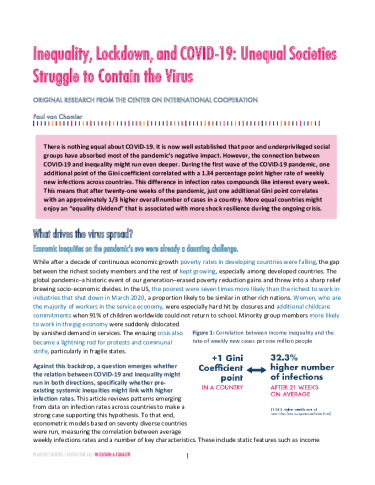There is nothing equal about COVID-19. It is now well established that poor and underprivileged social groups have absorbed most of the pandemic’s negative impact. However, the connection between COVID-19 and inequality might run even deeper.
During the first wave of the COVID-19 pandemic, one additional point of the Gini coefficient correlated with a 1.34 percentage point higher rate of weekly new infections across countries. This difference in infection rates compounds like interest every week. This means that after twenty-one weeks of the pandemic, just one additional Gini coefficient point correlates with an approximately 1/3 higher overall number of cases in a country. More equal countries might enjoy an “equality dividend” that is associated with more shock resilience during the ongoing crisis.

“The same marginalized communities that were SARS-CoV-2 infection hotspots can also become fertile ground for the virus to develop new strains before enough people are vaccinated. In fact, inequality in the vaccine rollout, both within countries and between them, already displays a strong income-related pattern, which suggests the risk of repeating the mistake of letting inequities undermine the pandemic response.”
–Paul von Chamier, research officer at CIC
This new research from CIC sought to understand if pre-existing systemic inequities could be linked to higher COVID-19 infection rates, examining infection rates in 70 countries from mid-March 2020 through early August 2020, or what is widely seen as the first 21 weeks of the pandemic. It also studied these nations’ levels of inequality and other potential predictive variables: government efficiency (a measure indicating quality of public services and civil service capability), urban population share, share of the population over the age of 65, lockdown measures (calculated by stringency), and geographic mobility (a population’s physical movements as measured by Google’s COVID-19 Community Mobility Reports). The study tracked inequality by using the “Gini Coefficient,” a commonly used metric for measuring income inequality within nations–or, specifically, how far a country’s wealth or income distribution deviates from a completely equal distribution. Under this calculation, the higher the coefficient, the greater the income inequality within that country.
